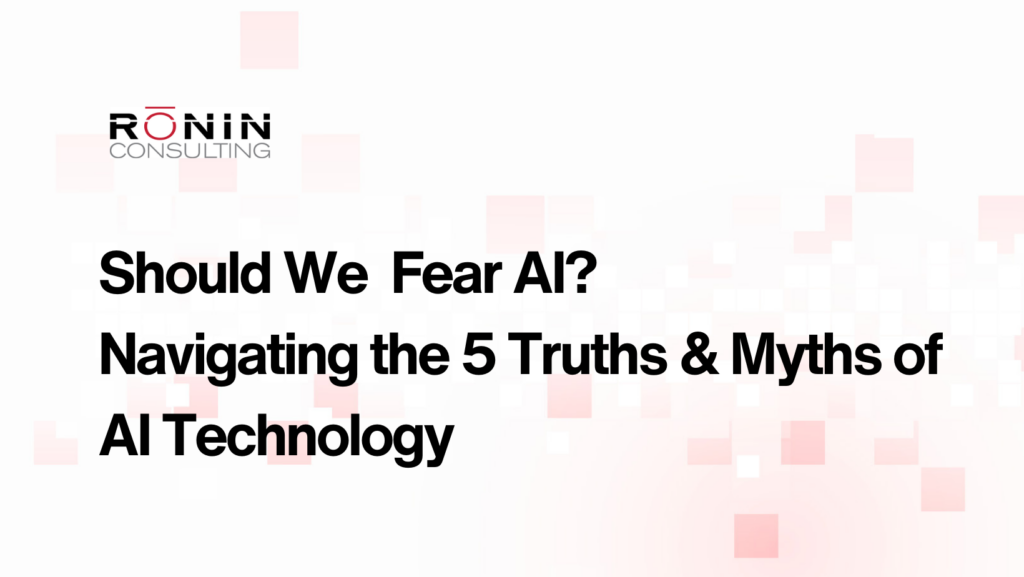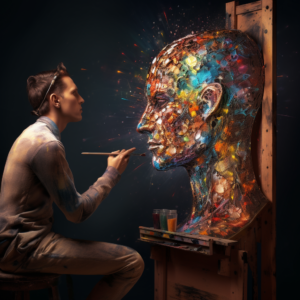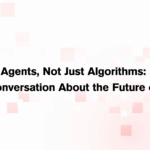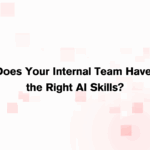
Artificial Intelligence (AI) has become a buzzword that often elicits mixed emotions in people. Some of us are fascinated by the potential of AI to revolutionize industries and make our lives more convenient, and others fear that AI might one day outsmart us or replace our jobs.
As someone who has waffled between all the AI emotions, I can see why there are so many conflicting opinions. While some of my feelings might be completely groundless (no, an AI robot will not abduct us while we are sleeping), others are entirely justifiable (yes, some people will lose jobs to AI).
In this article, I will delve into some of the myths and realities surrounding AI technology and shed some light on whether these fears are justified or if we should embrace AI with cautious optimism.
Myth 1: AI Will Definitely Take Over the World
One of the most pervasive AI myths is that AI will surpass human intelligence and take control of the world. While I will never turn off “The Terminator,” and I’m a sucker for a good dystopian movie – the AI reality is far less dramatic.
Reality: Current AI models lack consciousness and intent. AI models are designed to perform extremely specific tasks, and their abilities are constrained by the data and algorithms they’re built upon. They don’t possess self-awareness, emotions, or the capacity to plot world domination. AI’s power lies in its ability to process vast amounts of data and make predictions based on patterns, but it still does not possess the cognitive flexibility and creativity humans do.
Also, humans develop and maintain AI technologies, and strict ethical guidelines and regulations are in place to ensure their responsible use. As long as these safeguards remain in effect, the idea of AI taking over the world remains firmly in science fiction.
Myth 2: AI Technology Will Steal Our Jobs
Another common fear surrounding AI is that its use will lead to widespread job loss as machines become more proficient at tasks traditionally performed by humans.
Reality: While it’s true that AI can automate specific tasks, the relationship between AI and employment is more complex than AI busting in through walls like the Kool-Aid man to steal all our jobs. AI is more nuanced than that. It shows up at the party ready to help with its ability to augment our human capabilities and create new job opportunities–it’s not showing up to steal our good time.
Using AI correctly can help us with many repetitive, dull, data-driven tasks. It is another tool we can use to free up our work hours so we can focus on strategic or creative work. For example, AI can help analyze medical images and data in healthcare, allowing doctors to spend more time with patients and make more accurate diagnoses. When used within the finance industry, AI can analyze vast amounts of financial data in real time, helping investors make informed decisions and manage portfolios more effectively. The usage of AI is limitless – it all depends on how you want to build and develop AI for your business.
Myth 3: AI Technology is Infallible
Some people believe that AI is infallible and that its predictions and decisions are always correct and unbiased.
Reality: AI is not infallible and only as good as the data it’s trained on and its algorithms. AI systems can inherit biases in the data, which could lead to incorrect outcomes and misleading answers. For instance, if a facial recognition system is trained primarily on data from one demographic group, it may perform poorly on individuals from underrepresented groups. Also, AI might inadvertently perpetuate existing biases and discrimination within historical data, raising a gambit of ethical concerns about the truthfulness of its output.
Unfortunately, bias in AI is a serious concern and an ongoing challenge. Researchers and organizations are actively developing methods to reduce bias and improve the fairness and transparency of AI systems. When using AI platforms within your business, it’s crucial to approach AI critically and recognize that it can make mistakes, especially when used in complex or nuanced decision-making scenarios.
Myth 4: AI Understands Like Humans
Many people assume that AI systems, particularly natural language processing models like chatbots and virtual assistants, understand language and context just like humans do.
Reality: AI processes language differently from humans. AI models are based on statistical patterns and do not possess true understanding or consciousness. They rely on vast datasets and mathematical algorithms to predict the most likely responses based on their input.
While AI has made impressive strides in natural language understanding, it still struggles with nuances, sarcasm, and context.
With human language estimated to be at least 73-90% nonverbal cues, it should be no surprise that an AI model might also struggle to unravel the nuances of humor, sarcasm, and cultural and situational context.
Myth 5: AI Technology Can Replace Human Creativity

Some fear AI will render human creativity obsolete by generating all our art, music, and literature.
Reality: AI can assist and enhance human creativity but will never replace it entirely. AI can generate content based on patterns in the existing data, but it cannot innovate or express genuine human emotions and experiences.
While AI-generated content or design prompts can be initially helpful, it soon becomes clear that AI-generated creativity lacks the depth and originality we human creators bring to our work. For example, the image depicted above was created using the AI image-generating program Midjourney. Midjourney can generate images based on patterns and styles it has learned, but it lacks the deeper understanding or emotional connection a human artist can infuse into their work. Also, AI art creation platforms like Midjourney are still under scrutiny, so the question of whether AI-generated art can be truly considered “creative” remains a subject of debate.
Creativity is a uniquely human trait, encompassing the ability to think beyond established boundaries. While AI may excel in pattern recognition and generating content based on existing data, it still lacks the consciousness, intuition, and subjective experiences that fuel human creativity.
Embrace AI with Caution and Understanding
In the grand debate surrounding AI, you must navigate the myths and realities with a balanced perspective. AI is a powerful tool that can potentially improve various aspects of our lives, but it has limitations and ethical challenges.
There is no need to fear AI. Instead, we should approach it cautiously, understanding its capabilities and limitations.
Ultimately, the future of AI depends on how we choose to use it and regulate it. If we embrace AI with transparency and are responsible for innovation, AI can become an asset that enhances our lives without replacing our humanity.
At Rōnin Consulting, we choose not to fear AI but to embrace it with open arms. As a software consulting company, we recognize AI’s immense potential for our clients and their industries. We understand that AI is a tool that can bring about transformative results when wielded with care and expertise–and that is exactly what we plan to do. So, watch out for our custom AI tools as we continue to explore this new technology to create innovative solutions that address real-world challenges for all our clients.
Want to learn more about AI technology? Contact the team at Rōnin today!





